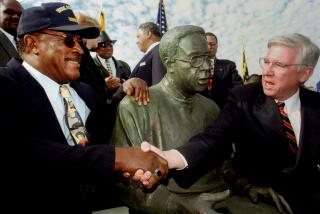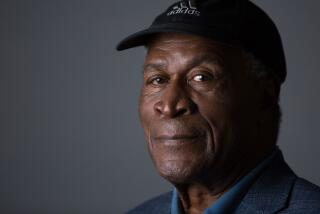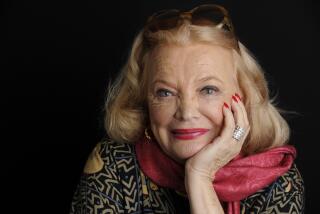John Randolph, 88; Tony-Winning Character Actor Was Blacklisted
- Share via
John Randolph, a Tony Award-winning stage, screen and television character actor and a union and social activist who was blacklisted during the McCarthy era, has died. He was 88.
Randolph, who continued acting until about four years ago, died of natural causes Tuesday at his home in Hollywood, according to his family.
He was not a household name, but the balding actor was a familiar face in movies and on television, where he often played authority figures.
He was the mayor in “Earthquake” (1974); a police chief in “Serpico” (1973); a judge in “Frances” (1982); and Jack Nicholson’s father in “Prizzi’s Honor” (1985). Most recently, he played Tom Hanks’ grandfather in “You’ve Got Mail” (1998).
Randolph made frequent guest appearances on television series, as well as appearing in the TV movie “The Missiles of October” and “Sandburg’s Lincoln,” a miniseries.
He also was a cast member on several series, including “Lucas Tanner” (1975) and “Grand” (1990), and he played Roseanne’s father on several episodes of “Roseanne.”
Randolph was such a familiar face that when people recognized him on the street, they’d ask if they knew him.
“He’d say, ‘Yes, I’ve been in your living room many times,’” his daughter-in-law, Kate Randolph, said Thursday.
But Randolph, who made his Broadway debut in 1938 in “Medicine Show,” had an even longer career on stage.
He appeared in the original New York stage productions of “The Sound of Music,” “Paint Your Wagon,” “The Visit,” “Come Back, Little Sheba” and “Command Decision,” and he was frequently seen on local stages until 2000.
In 1987, he received both a Tony and a Drama Desk Award for his role as the “Trotskyite, communist, left-wing grandfather” in Neil Simon’s “Broadway Bound.”
“He was a fine man and a wonderful actor,” longtime friend James Whitmore, who appeared in “Command Decision” in 1947 with Randolph, told The Times on Thursday. “He had a marvelous sense of humor and never took himself too seriously. I prized his friendship.”
Actor Ossie Davis, another longtime friend, said: “John was a damn good actor and he brought a sense of realism and ease to whatever it was that he was doing.”
Davis, who met Randolph about 1950, also remembered his friend’s activism for a variety of causes.
“It was basically the black and white struggle, the anti-communist struggle -- all of those things, John was in the thick of it, and I certainly wasn’t too far behind,” he said.
The son of Russian and Romanian immigrants, Randolph was born Emanuel Cohen in the Bronx. But his mother remarried after his father died, and his stepfather, Joseph Lippman, renamed him Mortimer.
Randolph, whose dramatic training began with two years in the Federal Theatre Project in the 1930s and who later studied acting with Stella Adler, legally changed his name to John Randolph in 1940.
A self-described “old radical,” Randolph told the Los Angeles Times in 1988 that his activism started in the 1930s.
“How could you not become radicalized during the Depression?” he asked. “You’d have to be an idiot not to be radical with 17 million unemployed. Also, I went to a wonderful college, City College of New York, and the ferment there was extraordinary.
“It opened up a communist point of view, Socialism, Marxism, Henry George, all that. There’s nothing wrong with absorbing new ideas and testing them.”
Randolph, who served in the Army Air Forces during World War II, married actress Sarah Cunningham in Chicago in 1945 between his matinee and evening performance in the Orson Welles-produced and directed “Native Son.” Cunningham died in 1986.
After the war, Randolph became one of the original members of the Actors Studio.
He also resumed his activism, rallying for better housing for veterans; for striking miners in Harlan County, Ky.; and against the death penalty for Willie McGee, who was nevertheless executed for raping a white woman in Mississippi; and for convicted spies Julius and Ethel Rosenberg. He later marched with the Rev. Martin Luther King Jr.
In the early 1950s, his outspokenness and defense of other accused figures during McCarthyism led to his being blacklisted -- as was his wife. In 1955, they were both called before the House Un-American Activities Committee.
“They both were hostile witnesses,” his daughter-in-law said. “They took the Fifth and refused to answer any questions.”
Although he lost many acting jobs during his 15 years on the blacklist, Randolph continued to work onstage in and out of New York.
Davis recalled that “John was someone who would always manage to get a job, and any other actors who needed a buck or whose cause needed support could depend on John.”
Randolph’s career took a dramatic upswing when director John Frankenheimer cast him -- as well as fellow blacklisted actors Will Geer and Jeff Corey -- in the 1966 science fiction drama “Seconds.”
In the film, Randolph plays a disenchanted middle-aged man who is surgically made to look decades younger; Rock Hudson plays the role for the remainder of the movie.
The film not only broke the blacklist for Randolph, but also launched his career in movies, which included providing the voice for John Mitchell in “All the President’s Men.”
Randolph, who served on the board of directors for the Screen Actors Guild and the American Federation of Television and Radio Artists and Actors’ Equity, also was a past president of the local Ensemble Studio Theater.
Ever the activist, his causes in the 1980s included Amnesty International, medical aid to El Salvador, TransAfrica and Athletes and Artists Against Apartheid. He also headed the Council of American-Soviet Friendship, a cultural exchange organization.
He is survived by two children, Martha and Harrison; a granddaughter; and a brother, Jerry Lippman.
A memorial service is pending.


